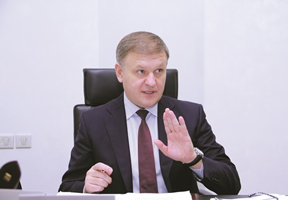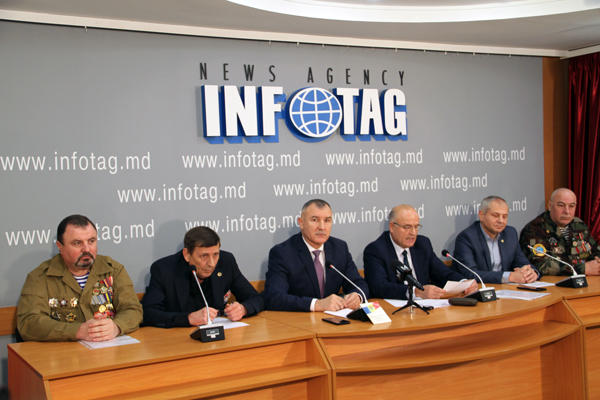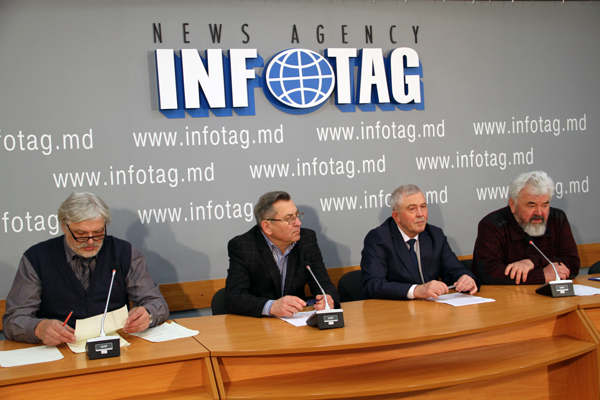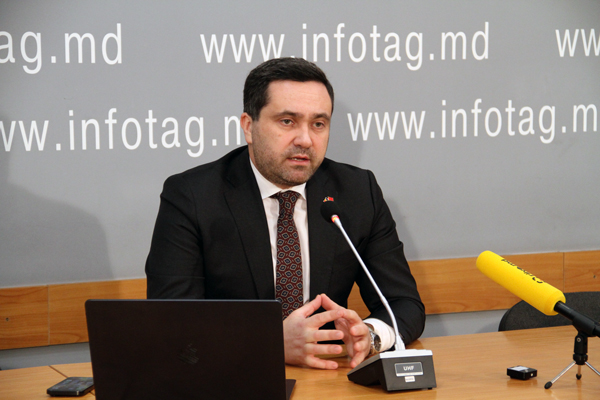Interview
UNFAVORABLE CREDITS SHOULD NOT BE EXAMINED IN ISOLATION FROM ECONOMIC SITUATION – MAIB PRESIDENT

Exclusive interview of Infotag Director Alexandru Tanas with the Moldova Agroindbank (MAIB) Chairman of the Board Sergiu Cebotari
PART 1. More than two thirds of MAIB unfavorable credits are urgent credits on which interest and the loan body are being paid.
The Moldovan society started to talk about the problems of unfavorable credits more often, which becomes actual due to what happened in 2014-2015. However, the discussion on this topic in isolation from the situation in Moldovan economy does not help, but on contrary damages the normal process of administrating such type of credits, which have migration properties, when they transform into redeemable credits from the bad credits.
It would be more correct to talk about unfavorable credits with a banker, who owns the biggest credit portfolio – 11.2 billion lei. Admitting certain subjectivity due to possible interest of the MAIB top manager, the Infotag correspondent counted more on the banker’s professional opinion and the point of view not so much on the very problem of such credits, but on their correspondence with the credit portfolio in general.
Question: Mr. Cebotari, tell me please, do bankers today have an understanding of the fact that if the problem of bad loans is not discussed at the level of the Moldovan Banks’ Association, National Bank of Moldova (NBM), the Government and the society in general, which has to understand the essence of unfavorable credits, there is a risk of creating an artificial “sterile crediting”. But, for a comparatively low and, more important, attractive rate of bad loans it will be necessary to pay an excessive price – bankruptcy of a big number of economic agents, whose credits are in the category of unfavorable.
Answer: You know, we even plan to conduct a number of special events to bring to the society the information on unfavorable credits, though we understand this is a function, uncharacteristic for the bank. However, unprofessional talks on this topic in some media outlets, given what happened with the three banks, provoke ambiguous reaction in society.
As for concrete figures on MAIB, taking into account the bank’s credit portfolio worth 11.2 billion, the rate of unfavorable credits accounts for 13.4%. 69% of these bad loans in categories C, D and E are urgent credits, on which the interest and the credit body are being repaid. This is why it is so important the structure of credits from this category. They are normal and working credits, which due to the delinquency or condition revising got into another category.
We simply could not fail to make a step towards clients, who got into a difficult situation due to the recession in economy, and to revise the conditions of credits with prolonging terms of their repayment. All this automatically leads to the fact that such credits are being transferred into another category – from B into C, becoming unfavorable. But this does not mean that this is a bad loan. It is a normal function of the bank to work with the borrower of such credit. From my point of view, the most important here is that the bank is managing these credits and risks on them. But this does not mean that the bank got in a risk zone and that it faces problems. This is a part of credits, which migrated into other risk categories, which leads to the diversion of a part of capital.
Q: You propose to look at such credits deeper and wider to consider them in complex?
A: I regard as important for the country to consider the notion and the classification of unfavorable credits deeper. I have said to the press before that in this case it is necessary to take into account the problems both inside the country and on external markets, where domestic clients are exporting their goods. The banks should support its clients. If we do not do this in a period, difficult for them, we will not find other economic agents in Moldova. There are about 60 thousand economic agents actively operating in the country. They are as they are today and there will not be others tomorrow. This is why we in MAIB have been working all these years for capitalizing companies and enterprises, explaining why it is necessary both to the bank and to companies.
Yes, currently, the rate of unfavorable credits has grown in our bank, though it is lower than the system’s average rate. I have to remind that this rate accounted in different time periods for 20% and even 30% in the banking system depending on the situation in the real sector of economy. In fact, the rate of unfavorable credits is mostly characterizing the condition of the real sector of economy, where enterprises are operating, but not only the bank’s financial stability. In this difficult for the business period, we are individually working with each client so that he to feel his bank’s support, but we are clearly analyzing all the risks for the bank. But this does not concern the category of clients, who are deliberately filing for bankruptcy. We do not shift clients’ risks on the bank and we grant them a pause respite only in cases we have possibilities to help and, the most important, find sense in this both for the bank and for the client.
Q: But this damages MAIB rates, does not it?
A: Of course, when the bank is knowingly accepting the prolongation or revising the conditions on credits, these are automatically migrating into another category of classification, being labeled as unfavorable. Unlike superficial and nonprofessional talks on the topic of bad loans, we in our bank understand that the label “unfavorable” does not mean that this credit is irreparable. I will repeat once again, citing our bank’s portfolio, that 69% of unfavorable credits are urgent credits, whose loaners are paying interest rates and the credits body in new time frames agreed with the bank.
Q: It turns out that credits got in the category of unfavorable first of all due to a difficult situation of the enterprise, while secondly, due to the bank, which lend a helping hand, giving to the client an additional chance to overcome problems?
A: We saw our help to such clients in prolonging the time of credit repayment, making the schedule of repayment more sparing. We are helping enterprises to survive in this difficult time; the economic agent needs a reliable partner, able to understand and financially support him, which the MAIB has done. We have all the time been and are always ready to make steps towards our clients, if they need this.
Q: But the diversion of personal capital in reserve funds on unfavorable credits is weakening the bank’s stability?
A: Our bank is financially stable; we have a big reserve of profit. We achieved good results this year, according to the nine-month results. And the reservation on unfavorable credits is nothing else but the deferred bank’s income in future periods. These credits were issued correctly at their time, according to the bank’s credit policy and the standards it has. But given the fact that entire branches and markets are sinking, enterprises are facing difficulties. The bank has to correctly react to the situation in the period of credit repayment, if borrowers got into a contingency. (The interview to be continued later today.)
























Add Comment